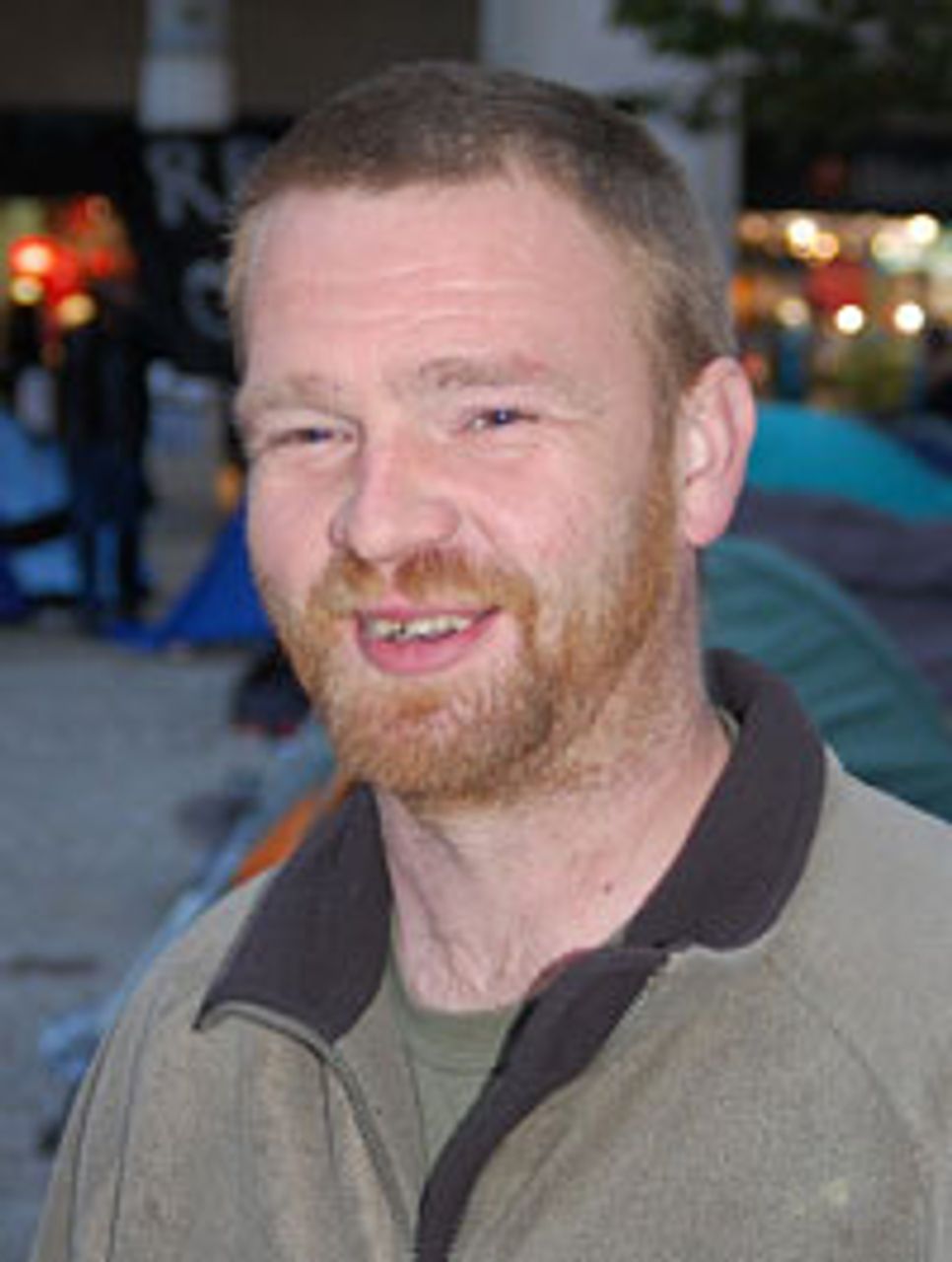The occupation begun on October 15 of the area surrounding St. Paul’s Cathedral in London is nearly two weeks old, with up to 500 camped out. As the numbers of those wanting to join the occupation have grown, the occupation has now spread to a second location in the city, Finsbury Square.
Concerted efforts are being made to close down the camp. Church authorities, after initially urging police not to clear the occupation because they had the democratic right to protest, are now demanding the area is cleared because it is affecting the commercial interests of the church authority.
 Matt
MattMatt, a plumber, explained why he came to support the protest. “I want to create a more equal society,” he said, “to be part of the movement. I’ve been studying for years on my own trying to get a better picture of the world and this is the culmination of it. It gives me goose bumps. It’s quite a brilliant movement and hopefully it’ll bring about a more equal society.
“Because it’s gone so global it has a big chance of making a change. Everyone’s come to realise that there is a global movement within the banks that is colluding and it’s about time the people did the same. It’s the same everywhere, austerity.
“Gone are the days when there was any sort of socialist segment to the Labour Party. They serve business interests just like the other parties. They just serve it in a different way. They’re just a better PR company than the Conservatives. That’s why there’s so much public anger and why the riots erupted. They always have when the Conservatives get in.
“Labour are great purveyors of hope. They say things are going to change, you are going to be better, but the Conservatives say no, you’re going to get stiffed, so get used to it. The riots were a public outcry of a destitute community. The trade unions that support Labour, they’re culpable as well.
“Capitalism in any shape or form is inherently going to produce an unequal society. It’s against human nature to have such a competitive society. Competition is part of human nature I suppose, but it can’t be at the forefront of everything we do. You’ve got to keep progressing to something better.
“The financial elite and capitalism are completely anathema to human progress. It stifles innovation. The corporate structure stops creativity, it’s very dangerous. The corporate structure is totalitarian. It’s a pyramid. Those at the bottom get the rawest deal. It’s no way to run a system. There needs to be more democracy throughout our communities and our workplaces.”
“The Troika are forcing privatisation and austerity on countries. Capitalism creates growth based on bubbles, but apart from that it’s created nothing but impoverishment for the working class. It’s keep feeding the banks, keep recapitalising them and make the people pay, like these are the masters of our universe, that have some divine right. Governments socialise losses and privatise profits.
People are waking up to it … I expect there is a connection between this and events in Tunisia and Egypt. It has inspired people and made people question the role of our government funding these dictators for so long, the way they’ve armed them militarily. It’s not just seeing these revolutions but questioning our government what their role was in these regimes.”
Chris from the United States said, “My dad’s worked for a paper company for 10-15 years now, a good guy, hard worker as his friends are too. But this company came in, bought it. It’s a front, it’s a capital management firm, some group of investors somewhere. If they can’t make enough money they’re probably going to sell it off.
“It’s going to completely devastate our town if the mill is closed. There’s about 20,000 people and about 2,000 to 3000 of the jobs are directly at the paper mill and they’re high paid jobs for the area. There are a lot of suppliers in the town that rely on the mill to buy their products, like wood timber companies.
“These people have never been to my town, have made no investment in what we’ve built, what we’ve done. And what offends me, they’re still going to make 20 times what anyone in my town makes in bonuses this year regardless of whether they keep the mill or shut it down. The last guy a couple years ago, he drove the company into bankruptcy and he still got a $10 million bonus. It just doesn’t make sense to me.
“I think it’s all the same frustration in each country, like finding it difficult to get work or losing jobs they’ve had for a long time while people at the top still make exorbitant amounts of money. It’s a big disconnect between what people are doing, working, making in reality and what people seem to be making on Wall Street.
“People today still feel entitled to a lot of the things my ancestors, who did help build unions, wanted—equality, worker protection. Those things are still important today. The unions aren’t fighting, and in some ways they’re not equipped to fight, to handle the company that bought the company that is based all around the world… There definitely needs to be an international character to a movement.”
 Glyn
GlynGlyn explained, “I am a part of the occupation. I travelled from Wales and been here since it started on Saturday. I’m here because of the oppression, waste and destruction of humankind at the hands of a few.
“Capitalism is the source of the problems. Fractional banking underpins it. It puts everyone into debt, a permanent cycle. This looting is going on in all countries, like Greece. It’s bankrupt and its encroaching on people and they’re scared. And when they’re scared they get together and fight.
“To remain independent from the unions is fundamental. I was a trade unionist with the AEEU until they sold out and supported Tony Blair in the Gulf War. Unions are no longer the independent organisations they once were. Some people are old enough to remember the ’70s and ’80s. We’re fighting for our very survival here. We’re fighting for the dignity of our fellow humans across the planet. We have dignity, we have rights and we have needs even though they’re getting trampled over.”
 Ollie
OllieOllie, a musician, explained, “I’ve been to a lot of protests over the years about separate small issues, but this is the first protest that has a cohesive message that everyone is united under one flag. There’s lots of people with lots of protests against current society and the way that the system is failing. They’ve all seemed to have come under this one flag with different views, but all under one cohesive opinion that it’s not working and it needs to change.
“The current system is failing the people. Governments are meant to represent the people, but they’re not representing the people. They align themselves with banks and big business and that should be a concern for anyone. It stops being a democracy and starts being a dictatorship.
“It’s the people speaking out and I think worldwide we’re sharing those financial woes. People don’t agree with the way the system is run. A survey the other day said 147 multinational companies really run the global economy. That’s a worry. They have 40 percent sway on international trade, which means they have political influence. Anyone should be worried about that.”
Fill out the form to be contacted by someone from the WSWS in your area about getting involved.
